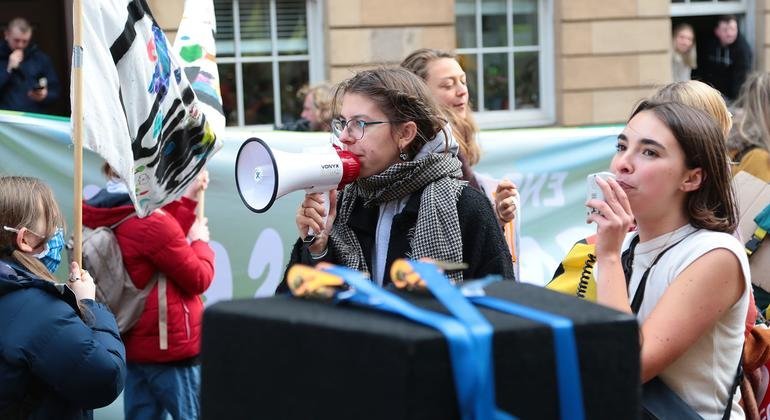In 2025, the Ministry for the Future, a powerful global organization advocating for the rights of the generations to come, convinces bankers and economists to introduce wide-ranging policies that finally reverse the effects of the devastating climate crisis and bring about a fairer, cleaner global economy.
If that sounds like science fiction, that’s because it is: this is the plot of Kim Stanley Robinson’s influential novel The Ministry for the Future, which imagines such a body being established as part of the 2015 Paris Agreement on climate change.
But maybe it’s not as outlandish as it might seem: this September, at UN Headquarters, the fate of future generations will take centre stage during the Summit of the Future, a landmark event at which world leaders will pledge to safeguard a better future for all.
Youth participants take part in International Youth Day at UN Headquarters.
As part of an overarching Pact for the Future, due to be adopted at the Summit, a Declaration on Future Generations is expected to be gavelled through. Alongside commitments to end inequality, bring about quality education for all and ensure long-term planning, this Declaration proposes a novel addition to the UN, a Special Envoy for Future Generations, who would be tasked with advocating across the UN system for better long-term thinking, and sharing the findings of the UN Futures Lab, the organization’s research arm.
But with so many people facing hardship right now, why is the UN considering setting up a new office to look after the interests of the 10 billion people who are yet to be born this century?
In fact, concern for future generations is enshrined in the UN Charter, the founding document of the Organization, written in 1945. Subsequently, a raft of international agreements has noted the importance of keeping in mind the needs of our descendants and, on top of that, almost 400 General Assembly resolutions have explicitly referenced future generations.
What’s more, the very concept of sustainable development is defined as meeting “the needs of the present without compromising the ability of future generations to meet their own needs” but UN Secretary-General António Guterres has argued that we “violate this principle daily”.

Youth attendees vote at an education financing event at UN headquarters.
Young people need a seat at the table
Advancing a renewed focus on the future, Mr. Guterres has been careful to point out that this does not equate to a neglect of the needs of those alive today. Indeed, “upholding the rights and meeting the needs of those alive today is a precondition for securing a better future”, he writes.
The UN chief has also made it clear that young people – who are often told that they are the future, which implies that they will have to sort out the mess created by the leaders of today – “should not bear the burden of advocating for our descendants, but they are deserving of a separate and dedicated place at the table.”
Making sure that the youth of today have a greater say in decisions that affect them has been at the forefront of UN policies for more than a decade. A UN Youth Envoy has worked to coordinate the inclusion of youth voices at major international events and helps the entire UN system to work with and for young people.
In December 2023, UN Secretary-General António Guterres appointed the first-ever Assistant Secretary-General for Youth Affairs, who was tasked with strengthening youth engagement in areas such as sustainable development, human rights, and peace and security.
A day of youth action
Felipe Paullier, formerly the Director General of the National Youth Institute of Uruguay, is the first incumbent. He says that he is keen to make sure that the Summit of the Future advances many issues that are important to young people.
The voices of young people will bookend the Summit: a youth-led Action Day in the iconic General Assembly Hall on Friday 20 September, will feature activists, celebrities, musical performances and dialogues involving Mr. Paullier and Mr. Guterres; on Monday 23 September, an interactive dialogue will take place in the Trusteeship Council Chamber, on how to enhance the global system for current and future generations.



